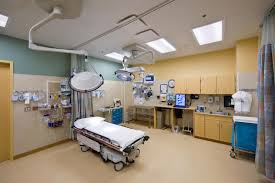Rehab Articles

Children’s Hospital Los Angeles researchers have started testing out an ER screening tool that can identify adolescent mental health issues, using the tool on adolescents who come to the emergency room with medical problems that could be caused by or linked to mental health problems as well. The study involved 992 ER patients who were adolescents, and 47.5% or close to half of the patients gave a yes answer to key identifying questions concerning behavioral symptoms, substance abuse, and exposure to trauma. Studies have shown that one in 10 adolescents will suffer from some type of mental illness, but only about half of these adolescents will receive any type of mental health services. In some cases chronic medical conditions can be caused by mental illness which is undiagnosed.
The ER screening tool for adolescent mental health issues may allow ER physicians to determine whether mental illness plays a role in the medical complaints of younger patients. According to the first study author, Emergency and Transport Medicine at Children’s Hospital Los Angeles director Alan L. Nager, M.D., M.H.A. “Based on recommendations from organizations, literature and research, it is becoming clear that identifying mental health needs is part of quality medical care. The emergency department is the ideal place for that assessment to occur.” Another author on the study, Children’s Outcomes, Research and Evaluation program at CHLA director Jeffrey I. Gold, Ph.D. explained “By embedding mental health screening in the emergency department, we are making it part of our health care culture —reducing the stigma associated with mental health problems and providing the opportunity for early identification and treatment for all children.”
Rehab Articles

When it comes to substance abuse treatment there are many different types of programs to choose from, and one of these is a luxury rehab, also frequently called an upscale treatment option. Many people mistakenly believe that this is an option only for celebrities and the very wealthy but this is actually not true. Luxury programs can offer many treatment benefits that others do not, and in some cases the results and recovery achieved are permanent. Many government and charity operated treatment programs for drug or alcohol abuse have a very limited menu of treatment methods available because they must operate on a shoestring budget. Usually these programs do not have individual counseling, which is generally viewed as one of the most effective treatment methods for substance abuse, because this method can be expensive to provide.
Another big consideration with substance abuse treatment at a luxury rehab is insurance coverage. While many insurance policies will cover outpatient group counseling few will cover the cost of an extended inpatient stay at a high end luxury rehab because of the price. Some of the most effective programs and facilities can run tens of thousands of dollars a month. In order to get a permanent recovery and eliminate the need for several rounds of treatment in between relapses a highly effective program is needed though. Group sessions and outpatient visits, or even a stay in a low budget inpatient program with very restricted treatment options, will not give you the same exceptional results and peace of mind that the best luxury rehabs can.
Rehab Articles
1. Stress- Many attribute the high rate of substance abuse among professionals to stress, at least in part although there are usually other factors in play as well. Successful professionals generally have higher levels of stress, both on and off the job, and this can contribute to alcohol or drug use.
2. High Level of Responsibility- A high level of responsibility can lead to feelings of being overwhelmed, and if this is not addressed then addiction treatment could become needed as the individual uses alcohol or drugs in order to cope with these emotions. Professionals often have a responsibility for staff and other employees as well as themselves.
3. Self Employed Means No Substance Abuse Screening- Since most professionals like doctors and lawyers are self employed it may be harder to detect substance abuse among professionals because there is no employer to insist on drug and alcohol abuse screening. The substance abuse may fly under the radar for much longer in these situations.
4. Stigma Associated With Treatment- Many people are hesitant to seek out addiction treatment because of the stigma that is associated with mental health and substance abuse issues. This stigma could cause the professional to lose patients or clients if the substance abuse becomes widely known.
5. Economic Losses- Another factor involved in the decision on whether to seek addiction treatment is the potential for economic losses. If a doctor, lawyer, or other professional has their own practice then being out of contact for weeks or longer could be economic suicide unless the right substance abuse treatment center for professionals is used.
Rehab Articles

In the last few years there have been news reports about incidents involving pilots who were struggling with mental health issues. Many airlines and aviation regulatory agencies expect pilots to self report any issues but is this letting the fox guard the chicken coop? Pilots may fail to disclose any problems out of concern that they will no longer be allowed to do their job, leading to a lack of income and a stigma associated with them that could affect their entire career in the aviation industry. The recent Germanwings crash also highlighted the issue of mental illness among pilots. In the USA the FAA created an exception in 2010 for pilots who are on antidepressant medication for depression that is categorized as mild to moderate, but even this is questionable.
Statistics show that those who start taking certain antidepressants can see an increase in the risk of harming themselves or others. Pilots who have mental illness may try to hide this fact so that their job and financial security is not jeopardized, but this could place the public at risk and few passengers would be willing to get on a plane if they knew the pilot was depressed and on medication. A balance needs to be struck so that the safety of passengers and the public are not placed at risk while allowing pilots to report any mental illness in a way that is safe and confidential. This is also true for pilots who are struggling with substance abuse problems. As long as the current system is in place pilots may not disclose any mental illness symptoms.



